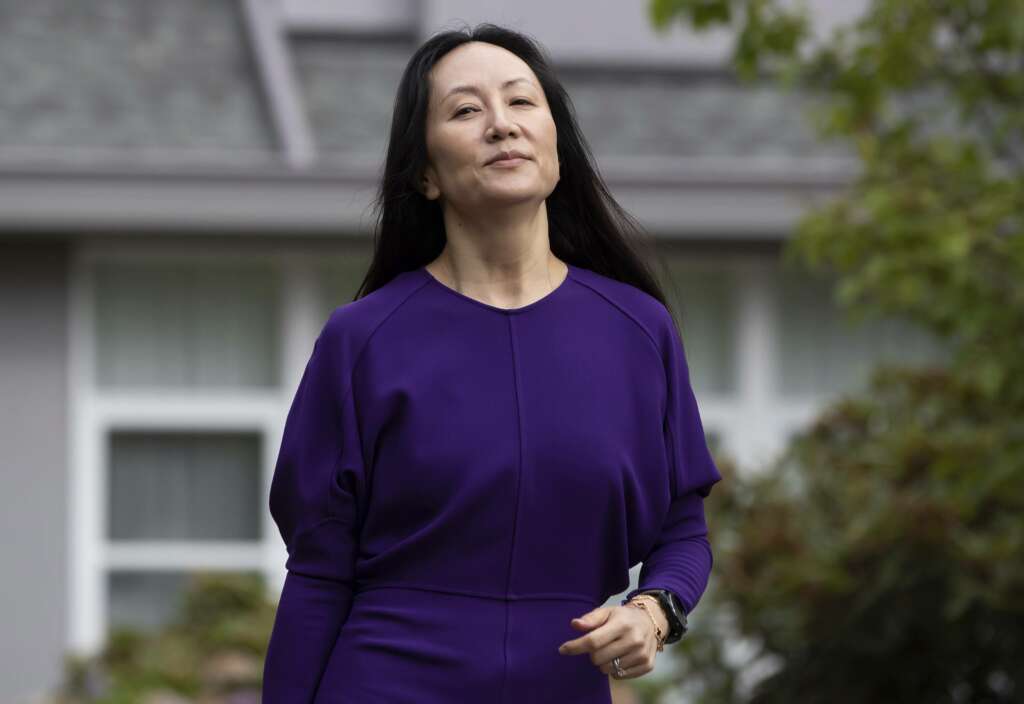
VANCOUVER, British Columbia (AP) — A Canadian judge reserved her decision Wednesday on whether a senior executive for Chinese communications giant Huawei Technologies should be extradited to the U.S. after a Canadian Justice Department lawyer wrapped up his case by saying there’s enough evidence to show she was dishonest and deserves to stand trial in the U.S.
Associate Chief Justice Heather Holmes said that on Oct. 21 she will likely announce when she will rule on whether Meng Wanzhou, the chief financial officer for Huawei’s Technologies and daughter of its founder, will be extradited.
Meng was arrested at Vancouver’s airport in late 2018 at the request of U.S. authorities. Her arrest infuriated Beijing, which sees her case as a political move designed to prevent China’s rise.
The U.S. wants Meng extradited to face fraud charges, alleging she committed fraud by misleading the HSBC bank about the company’s business dealings in Iran. It accuses Huawei of using a Hong Kong shell company called Skycom to sell equipment to Iran in violation of U.S. sanctions.
Defense lawyers have argued there isn’t enough evidence to justify her extradition.
But in his final submissions, Justice Department lawyer Robert Frater disputed defense claims there is no evidence Meng made any misrepresentations that put the bank at risk of violating sanctions.
“We say there is a strong case here Ms. Meng was dishonest,” Frater said. “We met our burden.”
By not disclosing Huawei’s true relationship with Skycom, Meng put HSBC at risk of violating U.S. sanctions against Iran, he said.
“HSBC was deprived of a fair opportunity to take the action it needed to take,” Frater told the judge.
He said Meng was honest in parts of her meeting with an HSBC executive, but she didn’t tell “the whole truth and nothing but the truth.”
Frater said the defense is trying to “blame the victim” in saying it was the bank’s decision to transfer money from Skycom through the U.S.
China’s government has criticized the arrest as part of U.S. efforts to hamper its technology development. Huawei, a maker of network equipment and smartphones, is China’s first global tech brand and is at the center of U.S.-Chinese tension over technology and the security of information systems.
Meng, who attended the hearing wearing an electronic monitoring device on her ankle, followed the proceedings through a translator.
Whatever the judge’s decision, it will likely be appealed.
The case has soured relations between Canada and China.
Entrepreneur Michael Spavor and a former Canadian diplomat were detained in what critics labeled “hostage politics” after Huawei’s Meng Wanzhou was arrested Dec. 1, 2018, at the Vancouver airport. They were were arrested in China in apparent retaliation for Meng’s arrest.
A Chinese court this month sentenced Spavor to 11 years in prison for spying.
In another case, the Higher People’s Court of Liaoning province in northeast China rejected an appeal by Canadian Robert Schellenberg, whose 15-year prison term on drug smuggling charges was increased to death in January 2019 following Meng’s arrest.
Meng remains free on bail in Vancouver and is living in a mansion.
Beijing denies there is a connection between Meng’s case and the arrests of Spavor and Kovrig, but Chinese officials and state media frequently mention the two men in relation to whether or not Meng is allowed to return to China.
Canada and other countries, including Australia and the Philippines, face trade boycotts and other Chinese pressure in disputes with Beijing over human rights, the coronavirus and control of the South China Sea. The United States has warned American travelers face a “heightened risk of arbitrary detention” in China for reasons other than to enforce laws.
China has tried to pressure Canadian Prime Minister Justin Trudeau’s government by imposing restrictions on imports of canola seed oil and other products from Canada.
Meanwhile, Beijing is blocking imports of Australian wheat, wine and other products after its government called for an investigation into the origin of the coronavirus pandemic.
Copyright
© 2021 . All rights reserved. This website is not intended for users located within the European Economic Area.
